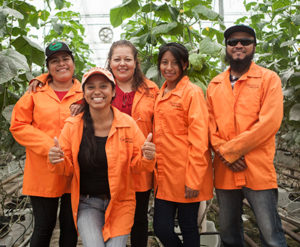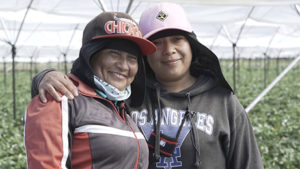For some growers, the phrase “organizational culture” can seem like just another buzz word that doesn’t apply to their main focus of producing high-quality fruits and vegetables. But in this competitive marketplace, where there is an acute labor shortage, creating a strong culture can be a game changer to attract and retain talent and ensure profitability.
A good organizational culture for companies of all sizes includes well-defined values, a true sense of mission and positive expectations for employees, who feel they are respected and appreciated. As Forbes noted, when people feel like they belong to an organization, they’re more likely to stick around for the long term. That means lower turnover, fewer new hires to deal with and better chemistry among the team.
 Google is often cited as one of the best companies to work for. Employees receive a wide variety of perks, including a flexible work schedule and a fun, casual environment that results in a more enjoyable work experience. All of this is designed to keep employees happy, productive and loyal to the company, which contributes to Google’s success.
Google is often cited as one of the best companies to work for. Employees receive a wide variety of perks, including a flexible work schedule and a fun, casual environment that results in a more enjoyable work experience. All of this is designed to keep employees happy, productive and loyal to the company, which contributes to Google’s success.
The Department of Economics at the University of Warwick found that happy workers are 12% more productive than average workers, while unhappy workers are 10% less productive than the average. Worker productivity is directly tied to job satisfaction and empowered and respected workers. It’s estimated that unhappy employees cost American businesses over $300 billion each year.
While it might be easier to consider the importance of workplace culture in large, white-collar organizations, the need to have a strong culture does not just apply to companies like Google, with its “Googleplex” campus equipped with volleyball, yoga and other amenities. The reality is that workplace culture is equally important at companies with mostly blue-collar jobs. A good culture is especially important for farmworkers, who are ultimately responsible for the safety and quality of our food.
Equitable Food Initiative (EFI), a nonprofit social enterprise, was created to transform agriculture through farmworker engagement. EFI’s workforce development programs are designed to bring profound cultural shifts to farms, leading to collaborative and respectful work environments, engaged workforces and strong relationships based on trust and transparency. The results include improved business performance for growers with documented return on investment — not to mention higher levels of assurance for retailers and consumers.
Shawn Hartley, owner and vice president of Onions 52, put it this way: “In a time of labor shortage, listening to and engaging your workforce gives you a competitive edge. We implemented EFI because we wanted to empower our workers, increase job satisfaction, provide growth opportunities and keep them with us for many years.”
 “Is it too expensive to have a socially responsible company? For me, it’s too expensive not to,” stated Kathryn Ault, vice president of customer solutions at NatureSweet Tomatoes. “If we look at what social responsibility means, it’s doing the right thing by your associates. Whenever you treat your associates well, they in return are going to be a more productive workforce. Aside from being the right thing to do, the biggest impact of the EFI certification is having a whole host of associates committed to the quality and output of the product.”
“Is it too expensive to have a socially responsible company? For me, it’s too expensive not to,” stated Kathryn Ault, vice president of customer solutions at NatureSweet Tomatoes. “If we look at what social responsibility means, it’s doing the right thing by your associates. Whenever you treat your associates well, they in return are going to be a more productive workforce. Aside from being the right thing to do, the biggest impact of the EFI certification is having a whole host of associates committed to the quality and output of the product.”
Monster Worldwide, an online leader in matching job candidates with companies, notes in its advice on workforce planning that “despite its importance, most companies pay relatively little formal attention to culture, simply letting it evolve. This is unfortunate, since actively managing and developing culture through recruitment can significantly improve employee retention and performance, which directly influence organizational profitability and growth.”
“We were doing a lot of the right things to begin with,” said Kevin Doran, chief executive officer at Houweling’s Group, “so it’s nice to have someone come in and validate those good things and at the same time make recommendations on where you can do more and improve. That’s the difference between EFI and other certifications — once you are certified, you continue to hear from EFI. The relationship is fluid, ongoing, and it’s all about continuous improvement.”
As part of the certification process EFI forms Leadership Teams composed of farmworkers, managers and other staff who help to ensure compliance with the EFI Standards. The training is designed to strengthen the essential skills of the team members, and they are guided to communicate across levels of the organization and create a work environment that is focused on problem-solving, increased collaboration and improvement.
Creating a stronger organizational culture can help address the labor shortage; but imagine launching a workforce development program that also increases productivity, addresses food safety issues and helps improve quality. Engage your workers to share their valuable experience, knowledge and perspective and your organizational culture will thrive.
For more information on EFI’s workforce development programs, contact Kevin Boyle.

